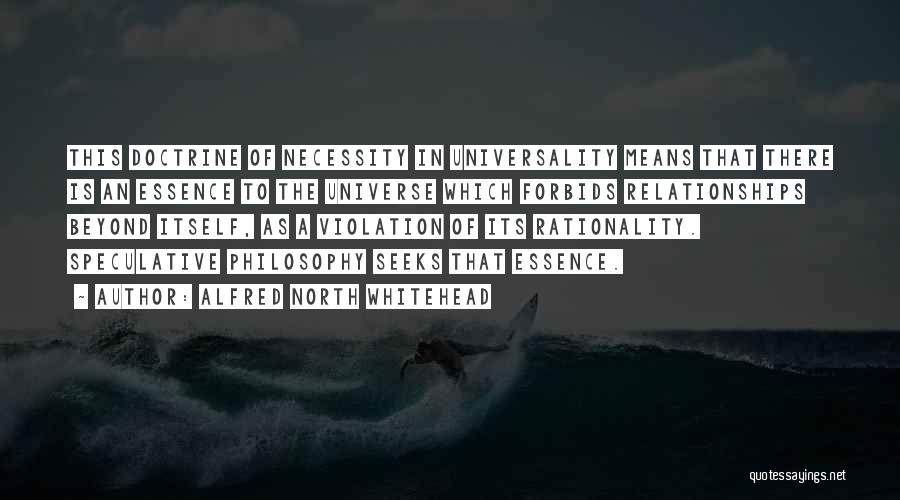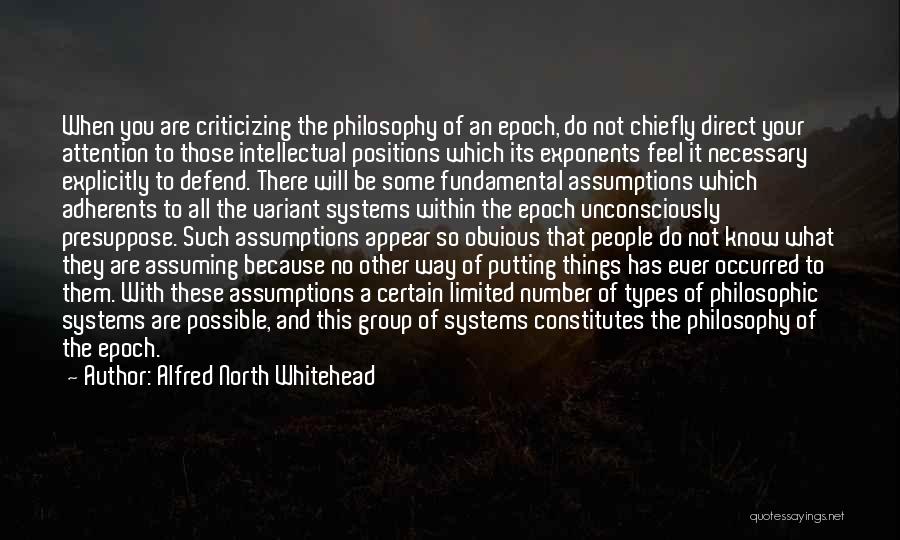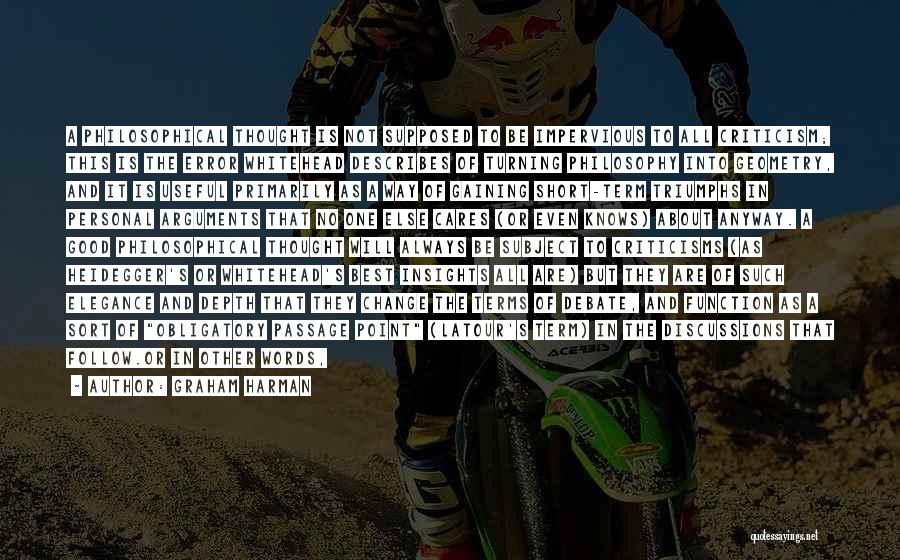Whitehead Philosophy Quotes & Sayings
Enjoy reading and share 19 famous quotes about Whitehead Philosophy with everyone.
Top Whitehead Philosophy Quotes

Every philosophy is tinged with the coloring of some secret imaginative background, which never emerges explicitly into its train of reasoning. — Alfred North Whitehead

Philosophy is the self-correction by consciousness of its own initial excess of subjectivity. — Alfred North Whitehead

Without doubt, if we are to go back to that ultimate, integral experience, unwarped by the sophistications of theory, that experience whose elucidation is the final aim of philosophy, the flux of things is one ultimate generalization around which we must weave our philosophical system. — Alfred North Whitehead

Science repudiates philosophy. In other words, it has never cared to justify its truth or explain its meaning. — Alfred North Whitehead

The chief error in philosophy is overstatement. — Alfred North Whitehead

It is presupposed that no entity can be conceived in complete abstraction from the system of the universe, and that it is the business of speculative philosophy to exhibit this truth. This character is its coherence. — Alfred North Whitehead

Philosophy is the product of wonder. — Alfred North Whitehead

Let me here remind you that the essence of dramatic tragedy is not unhappiness. It resides in the solemnity of the remorseless working of things. This inevitableness of destiny can only be illustrated in terms of human life by incidents which in fact involve unhappiness. For it is by them that the futility of escape can be made evident in the drama. This remorseless inevitableness is what pervades scientific thought. The laws of physics are the decrees of fate. — Alfred North Whitehead

All of Western philosophy is but a footnote to Plato. — Alfred North Whitehead

Philosophy begins in wonder. And at the end when philosophic thought has done its best the wonder remains. — Alfred North Whitehead

The aim of science is to seek the simplest explanations of complex facts. We are apt to fall into the error of thinking that the facts are simple because simplicity is the goal of our quest. The guiding motto in the life of every natural philosopher should be, 'Seek simplicity and distrust it. — Alfred North Whitehead

Philosophy asks the simple question: What is it all about? — Alfred North Whitehead

If the old saying is true, that what one generation learns in school is the philosophy of the next, then the philosophy of the next generation will be totalitarianism. — John Whitehead

This doctrine of necessity in universality means that there is an essence to the universe which forbids relationships beyond itself, as a violation of its rationality. Speculative philosophy seeks that essence. — Alfred North Whitehead

When you are criticizing the philosophy of an epoch, do not chiefly direct your attention to those intellectual positions which its exponents feel it necessary explicitly to defend. There will be some fundamental assumptions which adherents to all the variant systems within the epoch unconsciously presuppose. Such assumptions appear so obvious that people do not know what they are assuming because no other way of putting things has ever occurred to them. With these assumptions a certain limited number of types of philosophic systems are possible, and this group of systems constitutes the philosophy of the epoch. — Alfred North Whitehead

The safest general characterization of the European philosophical tradition is that it consists of a series of footnotes to Plato. — Alfred North Whitehead

PROCESS PHILOSOPHY, a school greatly influenced by Alfred North Whitehead, holds that mind and brain are manifestations of a single reality, one that is in constant flux. It thus is compatible with classical Buddhist philosophy, which views clear and penetrating awareness of change and impermanence (anicca in Pali) as the essence of insight. Thus, as Whitehead put it, "The reality is the process," and it is a process made up of vital transient "drops of experience, complex, and interdependent." This view is strikingly consistent with recent developments in quantum physics. — Jeffrey M. Schwartz

A philosophical thought is not supposed to be impervious to all criticism; this is the error Whitehead describes of turning philosophy into geometry, and it is useful primarily as a way of gaining short-term triumphs in personal arguments that no one else cares (or even knows) about anyway. A good philosophical thought will always be subject to criticisms (as Heidegger's or Whitehead's best insights all are) but they are of such elegance and depth that they change the terms of debate, and function as a sort of "obligatory passage point" (Latour's term) in the discussions that follow.
Or in other words, the reason Being and Time is still such a classic, with hundreds of thousands or millions of readers almost a century later, is not because Heidegger made "fewer mistakes" than others of his generation. Mistakes need to be cleaned up, but that is not the primary engine of personal or collective intellectual progress. — Graham Harman






